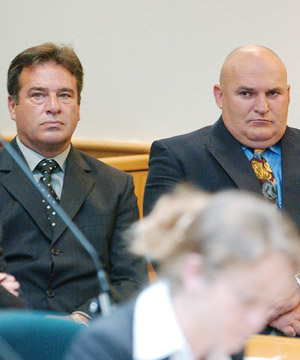Marika Pratley, Workers Party, Wellington Branch
The Spark September 2010
Eight women were denied compensation for being raped by police
officers at a recent Police Misconduct Forum. Seven cases proved police
misconduct in court, but only one woman was successful in bringing a
prosecution, against police officers Bob Schollum and Brad Shipton for rape in 2005. She was raped by them and another Tauranga man in 1989.

An inquiry into Police Misconduct and rape was initiated by Dame Margaret Bazley in which 300 cases of Police Misconduct were identified.
Former Police Minister Annette King began working with the 8 women to set up the forum in 2007. They were pressured into signing confidentiality agreements, meaning the other 300 women in the report were excluded from participation. Although compensation was considered, it was decided that it was not the government’s responsibility to compensate the eight women. This raises the issue of not just whether these survivors should be getting compensation, but how we can stop rape happening to begin with.
Will Compensation or the court system be able to solve the problem of
rape?
The court system is seen by many as a pathway to justice. However, there are several systematic faults within the court system, especially within the context of cases of sexual violation and rape. The person accused of rape has access to witness statements and statements from the survivor, whereas the survivor has no access to evidence given from the person they accused. The process of having to give evidence can be very draining. Compensation could cover costs of counselling and trauma for rape survivors; however it needs to be addressed that we demand a world where sexual violence and rape do not happen in the first place. Often rape and sexual violence are talked about as individual cases. However rape is so common that it cannot be put down to being an individual case. This a problem that is systemic in our society whether it’s the police, a friend, or a stranger, rape and sexual violence are common forms of abuse that take place, and need to be dealt with collectively.
Do cops really keep communities safer together?
In this case it is the police that are accused of raping these women. This
raises the question of whether the police can be trusted. It is highly
hypocritical that cops are given the power to prosecute and charge people with rape, but on the other hand are committing the act themselves and are able to get away with it. The government and ruling class do not want the credibility of police being questioned. It is important for the ruling class that the working class genuinely believe that the police force to do an honourable job of keeping our communities safe.
Over 300 people were included in the initial inquiry into police misconduct
yet only eight were allowed to participate in the forum. This shows that this is a systematic issue within the police force, and that there have been attempts made by the government to prevent investigation of and charges against these police from taking place. We cannot rely on politicians or the court to prosecute police or other figures in society who are expected to be
automatically respected. Safer communities together will only be possible when working people take control of society and organise it for the benefit of all.

Just another WordPress site